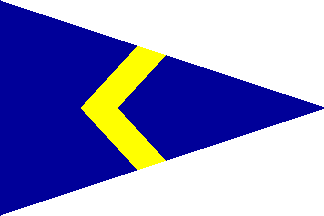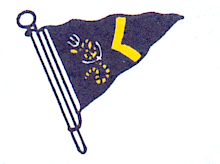
image by Peter Hans van den Muijzenberg, 07 June 2015

Last modified: 2015-07-04 by zoltán horváth
Keywords: barbados | yacht club |
Links: FOTW homepage |
search |
disclaimer and copyright |
write us |
mirrors

image by Peter Hans van den Muijzenberg, 07 June 2015
From Barbados
Yacht Club web site:
"As deemed appropriate in March 1991, the Management
Committee and Commodore Charles F. Packer commissioned a
contemporary emblem for the Barbados Yacht Club. The previous
insignia featured a Royal Coronet, a chevron and a flying fish,
and was utilized from 1932 to 1967. It was granted to the Yacht
Club during the empirical reign of King George V. Therefore a new
design was sought to convey the heritage of the past within the
society of a post independence Barbados.
The Board of Management retained the expertise of Heraldic Artist
Ann Rudder, who prepared a portfolio of sample logos for the
Yacht Club with relevant marks of identity for the Flag, Burgee,
Letterhead and all Properties thereof. The chosen logos were
submitted to the Cabinet Office of the Government of Barbados.
Permission of use was granted on October 17, 1991; for the
following emblem as blazoned:
Sable, issuant of a fess wavy Aqua and Azure at honour point a
chevron Or, conjoined in chief each to the dexter and sinister
with three piles nebuly Argent; surmounted in pale by a trident
anchor stocked of the first, fimbrated and fluked of the last,
cabled and bearing an annulet of the fourth, upon which the
initials B Y C are displayed.
The Coat of Arms of the Barbados Yacht Club depicts a Golden
Chevron arising from a wavy blue sea. This symbol has been
retained from the original grant. The word is derived from French
chevron, to describe a gable rafter for the roof of a
building or the central beam for the keel of a ship. Symbolically
this would convey protection or shelter on land or sea. An early
grant for the Carpenters’ Guild dated 1333, displayed the
chevron with three drafting compasses. Other worshipful companies
such as the Joiners and the Masons added the ‘L’ square
to their badges. Such fraternities were concerned “with the
mutual assistance of members of their brotherhoods in poverty,
sickness and death”. The duty of building individual moral
character within the preservation of these essentially all male
craft guilds was the foundation of most Masonic lodges, which
retain the compass and ‘L’ square emblem into modern
times.
The Anchor originated from pre Roman times. It became known to
Christian seafarers whose scriptures told of, “Which hope we
have as an anchor of the soul, both sure and steadfast”. Hebrew
6:19. Subsequently the anchor became symbol of Bishop
Nicholas, Patron Saint of sailors, travelers and children.
Mythically Poseidon [Neptune] ruler of oceans possessed the
Trident-Staff upheld by ‘Britannia’ who ruled the seas.
Although Barbados ‘broke’ from empire on November 30,
1966, the trident head was retained to indicate a civil
independence, and is foremost of all national emblems. Therefore
the grant to the Barbados Yacht Club is significant."
Dov Gutterman, 11 October 2008

image from Barbados
Yacht Club web site
redrawn by Peter Hans van den Muijzenberg, 07 June 2015
According to their website,
, the club was formally formed on 26 December 1924. Their burgee was adopted at
that time as well.
Lloyd's Register of American Yachts pictures the burgee as a circa 2:3 blue
triangle with a yellow hoistward chevron.
According to our page, quoting the earlier heraldry page of the club,
from 1932 on the club used an insignia of a Royal Coronet, a chevron and
a flying fish. Yet, according the club site's current history, the club
was granted a Royal charter in 1933 and became the Royal Barbados Yacht
Club at that time, a year later than that new insignia with the crown on it.
I'm not sure how these charters work and whether all of this can be true
at the same time, but it's apparently not relevant for their burgee, as
they write that the original burgee stayed in use until 1991. Indeed,
photographs from 1937 show the club flag to have the same design as the
orignal burgee, though it may be that the flag is a bit longer.
When Barbados became independent in 1966, the club dropped the "Royal"
from its name. (I'm not entirely sure why, as they still were under the
same Queen.) In 1991 the insignia was changed, and so was the burgee,
[though the text we quote doesn't seem relevant to the burgee change].
The website does indeed use a different burgee design as a logo, and
this we use on our page as well. In both cases, though, there appears to
be a colouring error, with the staff, the heading, and the gap between
them all in the same colour. I attach a cleaned-up version with less
artefacts and with staff and heading white with the gap transparent
between them.
I can't give a description of the burgee, as I can't say what we're
seeing exactly. Considering that a burgee should be easy to read at a
distance, I'm not sure the change of design was a good thing.
There may have been a reason for the change, but like the club at one
point decided to revert to their original name, I hope they'll also at
some point consider reverting to the clear design of their original burgee.
Peter Hans van den Muijzenberg, 07 June 2015
27 Jun 1932. Barbados Yacht Club applied for title Royal and Blue Ensign
defaced with badge of colony.
2 Sep 1932. Admiralty. Ensign refused. Low tonnage, little activity.
[Normally an overseas club was automatically granted a special ensign, providing
that the request was supported by the relevant Governor-General or Governor.]
20 Sep 1932. Colonial Office to Governor. Will he recommend for ‘Royal’ title ?
24 Oct 1932. Governor to Colonial Office. Supports application. Reference to
younger club in Bahamas that had been given title ‘Royal’.
17 Nov 1932. King George V’s Assistant Private Secretary to Colonial Office.
King agrees refusal of ensign. Not sure Royal. Wants to see Bahamas application.
24 Nov 1932. Bahamas application sent; also that of Jamaica.
28 Nov 1932. King approved title ‘Royal’ for Barbados Yacht Club.
[National Archives CO 323/1182/3]
12 July 1967. Royal patronage withdrawn on advice of Governor-General. Club
racially segregated. [National Archives FCO 23/28]
David Prothero, 07 June 2015
I don't know - it seems reasonably clear to me: a white anchor with its upper
crossbar transformed into the tines of a trident, and fouled with a golden rope.
Right?
Eugene Ipavec, 08 June 2015
So the warrant is in fact for 1932, rather than 1933? Or does it take a long
time to get from approval to warrant?
That would make more sense, yes. Though you've explained to us that patronage is
not the same thing as a Royal charter.
So, they probably reverted to the original name in 1967.
Peter Hans van den Muijzenberg, 08 June 2015
I think that the date on the warrant is the date of approval; but I am not
sure.
‘Royal patronage’ was the phrase used in the correspondence. Calling it ‘royal
approval’ would make more sense, and be less confusing.
David Prothero, 08 June 2015